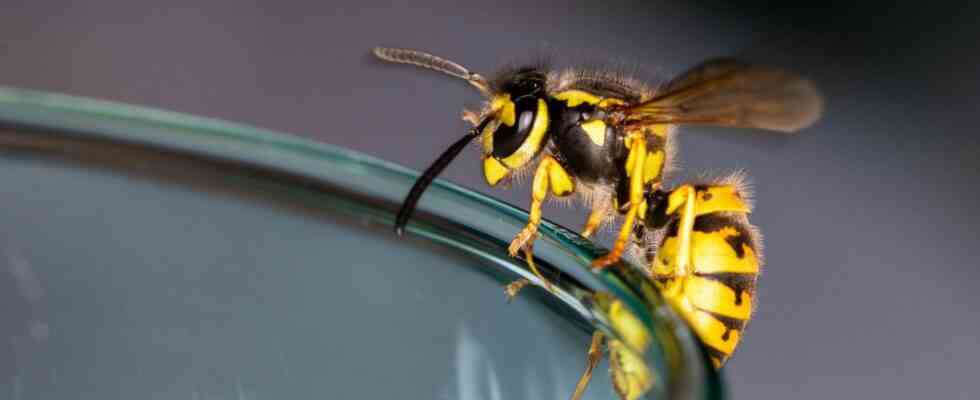Without chemistry
Drive away wasps: This is how the intrusive insects voluntarily disappear
Wasps are a problem in summer, especially for allergy sufferers
© JimmyR / Getty Images
By July at the latest you can no longer sit undisturbed in the garden or on the terrace without being harassed by wasps. However, you should not kill the animals. Instead, there are tried and tested ways to drive the insects away.
You might think that wasps have no decency: as soon as there is something edible (regardless of whether it is sweet or savory) on the table in summer, the insects pounce on it and – in the truest sense of the word – cut off a slice of it. However, the workers not only satisfy their own hunger, but also provide their offspring with the protein-rich and sugary snacks. And since they don’t even stop at drinks, the chances of being stung by a wasp are high between July and August. The risk is particularly great for children and adults who are allergic to a sting. The question arises: How can you drive away the annoying wasps without killing them?
Why not kill wasps?
Apart from the fact that wasps are under nature protection in Germany and may not be killed, there are numerous reasons why the yellow-black insects are quite useful: They hunt other pests such as mosquitoes and flies or aphids – and thus contribute to the biological pest control. But wasps themselves also serve as a food source for other animals, such as birds. In addition, insects actively help pollinate plants in spring and thus keep our ecosystem in balance. For this reason, the Nature Conservation Union (NABU) also advises against buying deadly wasp traps filled with juice or beer: “The animals die an agonizing death in the liquid. In addition, only old animals fall into the trap. The active colony does not decimated”.
A notice: Wasps become particularly aggressive when you wave them around wildly or blow on the insects. This is due to the carbon dioxide that is contained in your breath and triggers a kind of alarm signal in the animals.
How to get rid of wasps
Of course there is live traps, which you can use to repel wasps. Alternatively, the following home remedies should also help to flee the animals:
- Fresh basil is said to have a deterrent effect on wasps if you plant the herbs in your immediate area.
- The same supposedly applies to garlic: cut off several cloves and leave them on the table if you don’t mind.
- Acidic fruits such as lemons or oranges are said to be a tried and tested remedy against wasps if you cut them into slices and then add cloves.
- Essential Oils such as peppermint or lavender, citronella, clove or tea tree oil have a similar effect on wasps.
- Smoke also blows the insects into the air: light some coffee powder in a fireproof bowl and place it on the table.
- According to the State Association for the Protection of Birds (LBV), a light spray of clean water should also be effective against wasps, as they mistake the damp water for rain and flee.
Tip: To prevent insects from flying into your home, you can attach custom-fit insect screens to the windows and balcony doors attach (let).
Wasp nest discovered: what to do?
Even if (according to NABU) only the “unproblematic wasp species” tend to build their nests in bushes, behind wooden paneling or in roller shutters, many people still feel disturbed by this. Understandably, families with small children and allergy sufferers in particular are not comfortable with insects being constantly in their vicinity. But how do you actually behave when you have discovered a nest – or observed how one is being built? Most importantly, you should never attempt to remove the wasp burrow yourself. Instead, contact the responsible health or regulatory authority, a beekeeper or a professional pest controller. Apart from that, you should know that the animals leave their nest in autumn, after that you can clear it yourself.
These myths are not true
There are numerous myths about how to repel wasps – but not all of them are true. Such as the following three examples.
- Of the paper bag trick: It is said to hang up a brown paper bag that serves as a kind of mock wasp web. There is even now weatherproof models to buy. But do they really help? The effect is rather questionable, says NABU at least and points out the following: “In general, one can say that all species whose nests can be seen – i.e. hanging freely in the bushes or under the shed roof – can be assigned to the unproblematic species that disappear early. ” Of course, there is no harm in trying.
- No colourful clothes wear: you hear again and again that colored textiles attract wasps just like flowers. But is that really the case? In fact, the insectologist Prof. Dr. Heinz Mehlhorn from the Heinrich Heine University in Düsseldorf has a completely different opinion. In a picture interview, he makes it clear: “They don’t feed on flowers, but mainly on insects and spiders. They don’t react to colors, but to smells. They find everything sweet irresistible”.
- lying around copper coins drive away wasps: Seriously, who really thinks that a few cents on the table will make insects flee? At this point, it should be said to those who believe the myth to be true: There are neither well-founded studies that prove this, nor scientific literature about it.
You might also be interested in:
This article contains so-called affiliate links. There is more information here.



